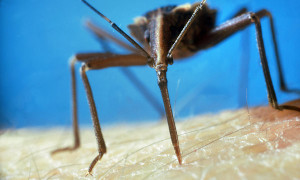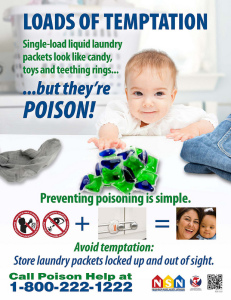Space Coast Daily Healthcare Headlines of the Week
By Dr. James Palermo // November 12, 2014
Topics Include: ‘Kissing Bug’ Disease On The Rise; Keep Detergent Pods Away From Children; Stay Off Work Emails At Home — and More.
‘KISSING BUG’ DISEASE ON THE RISE IN THE U.S.
As if we didn’t have enough on our minds with Ebola and Enterovirus D68, now, according to three new studies in the American Journal of Tropical Medicine and Hygiene, residents of the Southern United States may be at risk for a parasitic infection that causes few symptoms but can lead to heart complications and even death.
 Called Chagas Disease, it is caused by the parasitic protozoan Trypanosoma cruzi, which is transmitted through the feces of “kissing bugs” found across the South, and feed on exposed skin—often the face—during the night.
Called Chagas Disease, it is caused by the parasitic protozoan Trypanosoma cruzi, which is transmitted through the feces of “kissing bugs” found across the South, and feed on exposed skin—often the face—during the night.
The infection’s symptoms range from none at all to severe fever, body aches, fatigue, intestinal problems, and heart complications, which, if not treated, can be fatal.
Chagas Disease is curable if caught early, but it often is not because of the lack of symptoms in its early stages, resulting in the parasite causing heart disease in 30 percent of those infected.
Experts say that Chagas disease affects about 7 to 8 million people worldwide, and the Center for Disease Control estimates that about 300,000 Americans are infected with the parasite. (Eunjung Cha, Washington Post, 11/5)
LAUNDRY DETERGENT PODS POSE SERIOUS RISK TO CHILDREN
Keep those laundry detergent pods away from kids, poison control experts warn.
 Laundry detergent pods, all-in-one, highly concentrated single-load liquid laundry packets containing a pre-measured amount of detergent that is released in the wash so users don’t have to measure detergent in a cup, were introduced to the U.S. market in 2012.
Laundry detergent pods, all-in-one, highly concentrated single-load liquid laundry packets containing a pre-measured amount of detergent that is released in the wash so users don’t have to measure detergent in a cup, were introduced to the U.S. market in 2012.
According to researchers from the National Poison Data System, over 17 thousand calls regarding children younger than six who were exposed to the liquid detergent in the pods were placed to the U.S. poison control center in 2012 and 2013, with over 700 of the children subsequently needing hospitalization, of which one child died.
While the industry is moving in the right direction by crafting new and more child-resistant packaging, experts recommend that parents educate themselves on the toxicity and danger of the product and put immediate safety measures, such as placing the detergent pods in a locked cabinet or using traditional laundry detergent rather than the pods, into place. (Seaman, Reuters, 11/10)
FEDERAL OBAMACARE EXCHANGE PROVIDES FOR 5 DAYS OF “WINDOW SHOPPING”
2015 open enrollment on the Obamacare exchanges starts officially on Saturday November 15.
 However, the HealthCare.gov website, on which consumers can sign up for plans in the thirty four states that use the Federal exchange, opened for consumer “window shopping” on Monday, five days prior to the start of enrollment.
However, the HealthCare.gov website, on which consumers can sign up for plans in the thirty four states that use the Federal exchange, opened for consumer “window shopping” on Monday, five days prior to the start of enrollment.
The Washington Post reported that officials said consumers will be able to visit HealthCare.gov to “explore the benefits and prices of health plans that will be sold for 2015 through the federal health insurance exchange,” and that the revised site will be simpler, faster and more intuitive than it was during last year’s website calamities. (Goldstein, Washington Post, 11/9)
ANSWERING EMAILS AFTER WORK IS BAD FOR YOUR HEALTH
Many of us have done it–checked those work emails before going in to work or after coming home. In fact, it’s routine for a majority of people.
 According to a new study published in the Journal of Occupational Health Psychology, 52 percent of U.S. adults check their email before and after work, and even when taking a sick day.
According to a new study published in the Journal of Occupational Health Psychology, 52 percent of U.S. adults check their email before and after work, and even when taking a sick day.
This preoccupation with and urge for opening and responding quickly to digital work-related messages from clients, coworkers, or supervisors no matter when they come in has been dubbed “telepressure.”
Employees who function with a high level of telepressure were found to more likely report a harder time sleeping, higher levels of burnout, more health-related absences from work, and overall interference with needed work recovery time and stress-related outcomes. (Oaklander, TIME, 11/6)
PTSD LINKED TO RISK OF PREMATURE BIRTH
Expectant mothers with post-traumatic stress disorder (PTSD) should be treated as high-risk pregnancies, according to researchers at the March of Dimes Prematurity Research Center at Stanford University.
 The study, which was published online Nov. 6 in the journal Obstetrics & Gynecology, found that PTSD significantly increases the risk of preterm birth.
The study, which was published online Nov. 6 in the journal Obstetrics & Gynecology, found that PTSD significantly increases the risk of preterm birth.
“This study gives us a convincing epidemiological basis to say that, yes, PTSD is a risk factor for preterm delivery,” study senior author Ciaran Phibbs, associate professor of pediatrics at Stanford, said in a university news release.
Because of the findings of this research, the Veterans Affairs Administration has instructed all of its medical centers to treat all pregnancies among women with recent PTSD as high-risk. (Preidt, CBSNews, 11/7)












